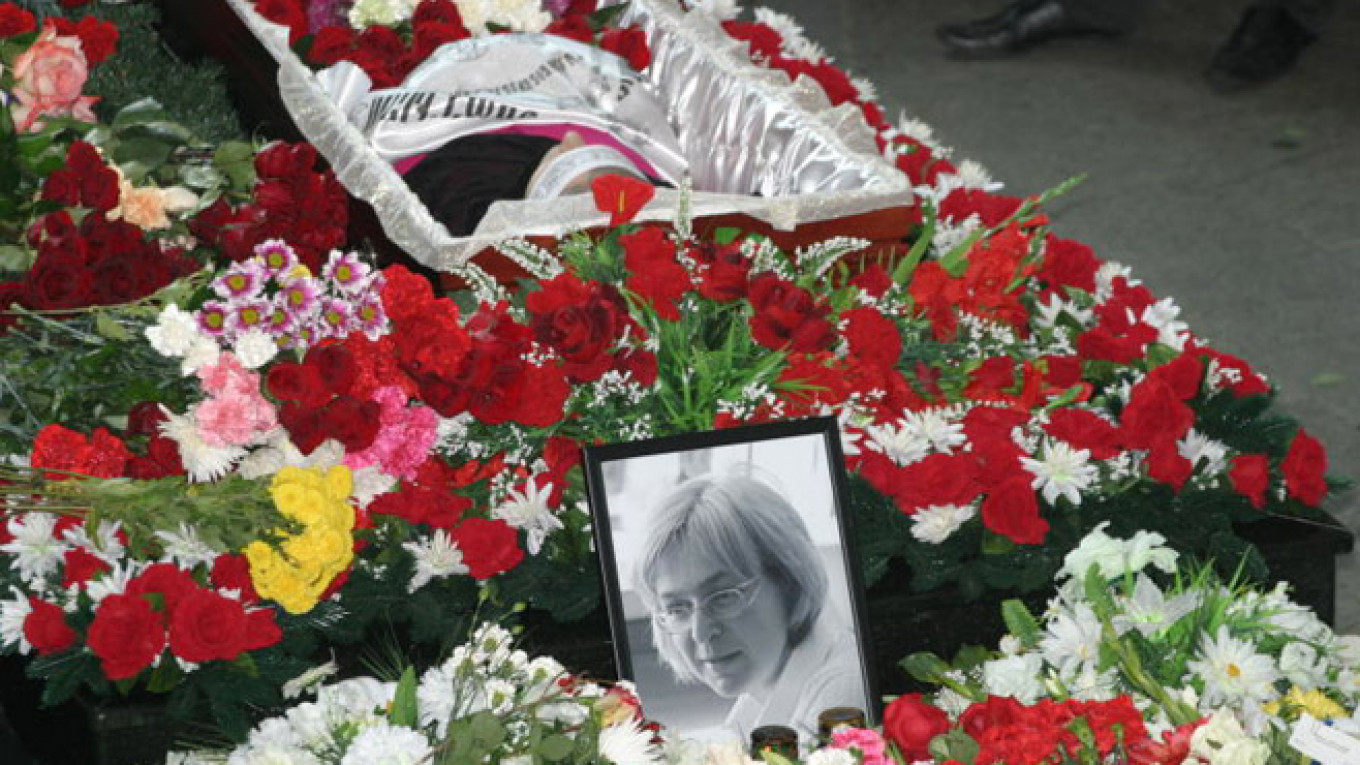Back in 2006, President Vladimir Putin learned of the murder of journalist Anna Politkovskaya while on a visit to Germany. He told German journalists at a news conference that Politkovskaya played no serious role in politics, and that her murder therefore did him more harm than good.
That was not the greatest impromptu performance before television cameras. It left many wondering whether Putin meant that, if Politkovskaya had been famous and popular, it would have made sense to kill her.
Immediately after the murder of Boris Nemtsov, presidential spokesman Dmitry Peskov used almost the same words. "With all due respect to the memory of Boris Nemtsov," Peskov said, "in political terms he was no threat, of course, to the current leadership of Russia and to Vladimir Putin."
In other words, as with Politkovskaya, if he had posed a threat, they would have killed him.
And now, when the authorities have settled on a single theory for the murder — namely, that it was carried out by Chechen religious extremists who happen to be personally acquainted with Chechen leader Ramzan Kadyrov — I again recalled the Politkovskaya case. That time, also, the authorities apprehended and later tried only the low-level functionaries who pulled the trigger, never revealing who ordered her murder or why.
And this despite the fact that the transcripts of the investigation and trial contained evidence that Politkovskaya's Chechen killers acted with the support of Russian intelligence agencies.
Many of the details of both Politkovksaya's and Nemtsov's murders were strikingly similar. Both were shot exactly four times. In both cases, investigators relied on surveillance camera footage to identify the assailants' car and on mobile phone communications near the scene of the crime. The Politkovskaya investigation quickly led to Moscow Federal Security Service (FSB) Lieutenant Colonel Pavel Ryaguzov. It was Ryaguzov who ascertained Politkovskaya's address and passed it along to his Chechen friend Shamil Burayev, who gave it to the killers.
The killers were assisted by Sergei Khadzhikurbanov, an employee of Moscow's police anti-mafia department (RUBOP). Ryaguzov and Khadzhikurbanov gave the killers not only all the files they could find on Politkovskaya in the FSB and RUBOP databases, but also transcripts of her telephone conversations.
The murder was preceded by police surveillance carried out by Dmitry Lebedev, Dmitry Grachyov and Oleg Alimov. Only after everything was ready did they issue the weapons to the killers.
Moscow policeman Dmitry Pavlyuchenkov provided his service pistol. In fact, Pavlyuchenkov played a major but still not fully explained role. And to ensure that the information remained secret, the authorities created a separate investigation into Pavlyuchenkov's role. The court reviewed that case "under special circumstances," barring members of the press from the proceedings.
And now the authorities are trying to foist a similar explanation for Nemtsov's murder on the public. They want us to believe that a few residents from a remote mountain republic could organize and carry out a complex crime a few steps from the Kremlin walls — the most heavily guarded spot in Moscow.
Meanwhile, evidence of the involvement of Russian intelligence agencies pops up with every deeper investigation into terrorist acts committed since Putin first came to power. It is no coincidence that former FSB agent Alexander Litvinenko titled his book about the apartment bombings in Moscow "Blowing Up Russia" and claimed that the FSB organized those bombings. It is no surprise that the authorities also conveniently blamed those attacks on Chechens.
The murder of Anna Politkovskaya in 2006 horrified the entire country. Is it possible that this latest bloody crime will also remain unsolved?
Andrei Malgin is a journalist, literary critic and blogger.
A Message from The Moscow Times:
Dear readers,
We are facing unprecedented challenges. Russia's Prosecutor General's Office has designated The Moscow Times as an "undesirable" organization, criminalizing our work and putting our staff at risk of prosecution. This follows our earlier unjust labeling as a "foreign agent."
These actions are direct attempts to silence independent journalism in Russia. The authorities claim our work "discredits the decisions of the Russian leadership." We see things differently: we strive to provide accurate, unbiased reporting on Russia.
We, the journalists of The Moscow Times, refuse to be silenced. But to continue our work, we need your help.
Your support, no matter how small, makes a world of difference. If you can, please support us monthly starting from just $2. It's quick to set up, and every contribution makes a significant impact.
By supporting The Moscow Times, you're defending open, independent journalism in the face of repression. Thank you for standing with us.
Remind me later.






